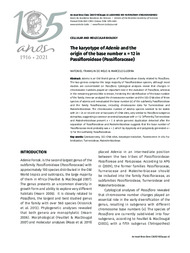The karyotype of Adenia and the origin of the base number x = 12 in Passifloroideae (Passifloraceae).
The karyotype of Adenia and the origin of the base number x = 12 in Passifloroideae (Passifloraceae).
Author(s): MELO, N. F. de; GUERRA, M.
Summary: Adenia is an Old World genus of Passifloroideae closely related to Passiflora. The two genera comprise the large majority of Passifloroideae species, although most studies are concentrated on Passiflora. Cytological analyses reveal that changes in chromosome numbers played an important role in the evolution of Passiflora, whereas in the remaining genera little is known, hindering the identification of the base number of the family. Here we analyzed the chromosome number and the 35S rDNA sites of three species of Adenia and reevaluated the base number (x) of the subfamily Passifloroideae and the family Passifloraceae, including chromosome data for Turneroideae and Malesherbioideae. The chromosome number of Adenia species seemed to be stable with 2n = 24 or 48 and one or two pairs of rDNA sites, very similar to Passiflora subgenus Astrophea, suggesting a common ancestral karyotype with x = 12. Differently, Turneroideae and Malesherbioideae present x = 7. A whole genomic duplication detected after the separation of Passifl oroideae and Malesherbioideae suggests that the base number of Passifl oraceae most probably was x = 7, which by dysploidy and polyploidy generated x = 12 for the subfamily Passifl oroideae.
Publication year: 2021
Types of publication: Journal article
Unit: Embrapa Semi-arid Region
Observation
Some of Embrapa's publications are published as ePub files. To read them, use or download one of the following free software options to your computer or mobile device. Android: Google Play Books; IOS: iBooks; Windows and Linux: Calibre.
Access other publications
Access the Agricultural Research Database (BDPA) to consult Embrapa's full library collection and records.
Visit Embrapa Bookstore to purchase books and other publications sold by Embrapa.

